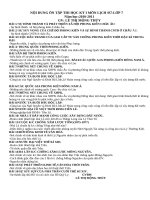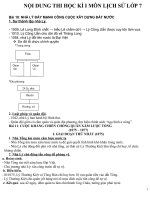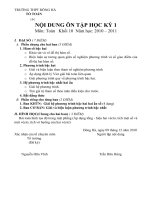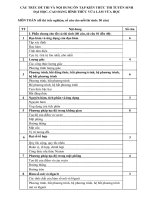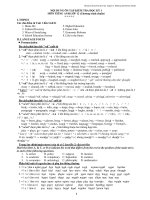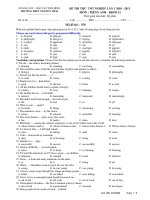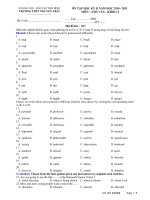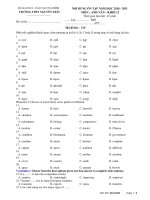- Trang chủ >>
- Lớp 6 >>
- Giáo dục công dân
Nội dung ôn tập các môn Khối 7 trong thời gian học sinh nghỉ học để phòng tránh dịch COVID-19
Bạn đang xem bản rút gọn của tài liệu. Xem và tải ngay bản đầy đủ của tài liệu tại đây (361.12 KB, 12 trang )
<span class='text_page_counter'>(1)</span><div class='page_container' data-page=1>
1
<b>TRƯỜNG THCS NGUYỄN LÂN </b>
<b>NỘI DUNG ÔN TẬP MÔN TIẾNG ANH 7 </b>
<b>(Trong thời gian học sinh nghỉ học phòng tránh dịch bệnh COVID-19) </b>
<i>Giới hạn: từ bài 7 đến bài 8 </i>
<b>Phần I: </b>
<b>Lý </b>
<b>thuyết </b>
<b>A. </b>
<b>Vocabul</b>
<b>ary </b>
<b>- Traffic problems in the world </b>
- Types of films
<i>-ed and -ing adjectives </i>
<b>B. Pronunciation: </b>
- Sounds: /e/ and /ei/
- Sounds: : /t/, /d/ and /id/
<b>C. Grammar: </b>
- It indicating distance
- Used to +V
<i>- Connectors: although, despite/in spite of, however, nevertheless </i>
<b>D. Writing: </b>
- Writing a paragraph about traffic problems
- Writing a paragraph about one’s favourite film
<b>Phần II : Bài tập Unit 7. Traffic </b>
<b>* Grammar </b>
<b>1. Used to: (Chỉ thói quen trong quá khứ) </b>
<b>“Used to” is to talk about past habits. It has the same form in all persons, singular and plural. </b>
It forms its negative and interrogative form with did.
Ex: I used to cry when I was a baby.
I didn’t use to
sleep late. Did
you use to sleep
late?
<b>2. Distance </b>
How far is it from ... to ... ?
It is about + km (from ... to ...
<b>A. PHONETICS </b>
<b>I. Find the word which has different sound in the underlined part. </b>
</div>
<span class='text_page_counter'>(2)</span><div class='page_container' data-page=2>
2
<b>B. VOCABULARY AND GRAMMAR </b>
<b>I. Complete the sentences with the correct form of “used to” and the verb in bracket. </b>
1. <b>(you/ enjoy) maths at school? </b>
2. I <b>(not like) flying, but I love it now. </b>
3. We <b>(be) friends, but we don’t get on now. </b>
4. <b>(John/ work) for IBM before he came here? </b>
5. Winters <b>(not/ be) as cold as they are now. </b>
6. She <b>(live) with her mother, but now she lives with her father. </b>
7. I <b>(not do) any exercise. </b>
8. <b>(he/ play) for Manchester United? </b>
<b>II. Choose the correct option for each gap in the sentences. </b>
1. Drivers have to their seatbelt whenever they drive.
A. put B. tie C. fasten D. put on
2. We should wait for the traffic lights before we cross the street.
A. turn green B. to turn green C. turn yellow D. to turn yellow
3. All of us have to obey strictly.
A. traffic rules B. traffic C. traffic jam D. regular
4. Cyclists and motorists have to wear a when they ride a motorbike.
A. hard hat B. cap C. mask D. helmet
5. He forgot to give a before he turned left and got a ticket.
A. signal B. sign C. light D. hand
6. does it take you to get to Ho Chi Minh City by plane? - About 2 hours.
A. How far B. How much C. How long D. How many
7. There a bus station in the city centre, but it has been moved to the suburbs.
A. used to be B. used to have C. use to have D. were
8. I marbles when I was young, but now I didn’t.
A. play B. used to play C. have played D. didn’t use to play
9. “ is it from your house to the nearest bus stop?” - “About 50 meters’
A. How far B. How long C. How often D. How much
10. We should the street at the zebra crossing.
A. walk B. walk on C. walk through D. walk across
11. Lan used to go to school .
A. with bicycle B. by foot C. in car D. by bus
12. Public in my town is good and cheap.
A. transport B. tour C. journey D. travel
13. is not very far from here to the city center.
A. That B. This C. It D. There
14. When there is a traffic jam, it me a very long time to go home.
</div>
<span class='text_page_counter'>(3)</span><div class='page_container' data-page=3>
3
A. but B. though C. because D. or
16. Yesterday Hoa and Lan round West Lake. It took them an hour.
A. cycle B. cycles C. cycling D. cycled
17. Minh used to his homework late in the evening.
A. does B. do C. doing D. did
18. If people the rules, there are no more accidents.
A. follow B. take care of C. obey D. remember
19. You should right and left when you go across the roads.
A. see B. look C. be D. take
20. Hurry up or we can’t the last bus home.
A. keep B. follow C. go D. catch
<b>III. Write sentences with “it”. Use these cues. </b>
1. 120 km/ Ho Chi Minh City/ Vung Tau
...
2. 384,400 km/ the Earth/ the Moon
...
3. not very far/ Ha Noi/ Noi Bai Airport
...
4. 500 meters/ my house/ nearest shop
...
5. 700 meters/ my house/ Youth Club
...
6. five km/ my home village/ nearest town
...
<b>C. READING </b>
<b>I. Read the passage and fill in the blanks with suitable words. </b>
Who are the (1) drivers? Which drivers are the safest on the roads? According to a
recent survey, young and inexperienced (2) are the most likely to have an accident. Older
drivers are more (3) . Young men have the worst accident records of all. They often (4)
faster cars with bigger engines. One of the (5)
interesting facts in the survey is that passengers have an effect on the
driver. When men have (6) friends in the car, their driving
become worse. When their wife or girlfriend is in the car, (7)
, their driving is better. But opposite is true for women. Their driving is (8)
dangerous when their husband or boyfriend is in the car.
<b>II. Read the following text carefully and choose the correct answer A, B, C or D for each of </b>
<b>the gap. </b>
When you are in Singapore, you can go about (1) taxi, by bus, or by underground. I
myself prefer the underground (2) it is fast, easy and cheap. There are (3) buses and
taxis in Singapore and one cannot drive
along the road (4) and without many stops, especially on Monday morning.
The underground is therefore usually quicker (5) taxis or buses. If you do not know Singapore
very well, it is difficult (6) the bus you want. You can take a taxi, but it is (7)
</div>
<span class='text_page_counter'>(4)</span><div class='page_container' data-page=4>
4
1. A. by B. in C. at D. on
2. A. but B. because C. when D. so
3. A. few
4. A. quick
B. a lot
B. quickly
C. many
C. quicker
D. some
D. quickest
5. A. so B. like C. than D. as
6. A. find B. to find C. finding D. found
7. A. less B. more C. most D. much
8. A. tell B. told C. tells D. telling
9. A. who B. what C. when D. how
10. A. how B. that C. when D. where
<b>III. Read the conversation and answer the </b>
<b>questions. Nga: Hi, Laura. </b>
<b>Laura: </b> Hi, Nga.
<b>Nga: </b> What did you do last Sunday?
<b>Laura: </b> I went to the supermarket with my mother in the morning. In the afternoon, I
cycled around West Lake.
<b>Nga: </b> Oh, that sounds really healthy. How did you go to the supermarket?
<b>Laura: </b> My mother and I cycled there. We usually go to the supermarket by bicycle on
Sunday. My father used to drive us there when I was small.
<b>Nga: </b> Really? How far is it from your house to the supermarket?
<b>Laura: </b> It’s about five kilometres.
<b>Nga: </b> How long does it take you?
<b>Laura: </b> It’s not long. About 15 minutes. I like cycling very much. Do you like to cycle
around West Lake with me next Sunday?
<b>Nga: </b> That sounds good.
<b>What time? Laura: </b> How
<b>about 3 p.m. at my house? Nga:</b>
OK. See you then.
1. Does Laura usually go to the supermarket on Sunday?
...
2. Who does Laura usually go with?
...
3. How did Laura go to the market when she was small?
...
4. What’s Laura’s hobby?
...
5. What will Laura and Nga do next Sunday?
...
<b>D. WRITING </b>
<b>I. Rewrite each sentence or question so it has the same meaning. Use “Used to”. </b>
<i><b>Ex: I was in the school tennis team. </b></i>
<i><b>→ I used to be in the school tennis team. </b></i>
1. Anna had long hair when she was at school.
</div>
<span class='text_page_counter'>(5)</span><div class='page_container' data-page=5>
5
...
3. Ricardo got up at 6.00 when he was training for the Olympics.
...
4. What did you usually do on Saturday evenings?
...
5. Sophie was afraid of dogs when she was a little girl.
...
6. We always gave our teachers presents at the end of term.
...
7. Did you live next door to Mrs. Harrison?
...
8. My brother wore glasses when he was young.
...
<b>II. Write statements, negatives or questions with “used to”. </b>
<i><b>1. Susan/ have/ a dog? </b></i> <i><b>(question) </b></i>
...
<i><b>2. people/ use/ mobile phones </b></i> <i><b>(negative) </b></i>
<i><b>... </b></i>
<i><b>3. he/ go/ swimming </b></i> <i><b>(statement) </b></i>
<i><b>... </b></i>
<i><b>4. they/ like/ jazz music? </b></i> <i><b>(question) </b></i>
<i><b>... </b></i>
<i><b>5. Olga’s family/ live/ in Moscow. </b></i> <i><b>(statement) </b></i>
<i><b>... </b></i>
<i><b>6. we/ drink/ coffee </b></i> <i><b>(negative) </b></i>
...
<i><b>7. my sister/ watch/ television </b></i> <i><b>(negative) </b></i>
<i><b>... </b></i>
<i><b>8. Tony/ work/ in a bank? </b></i> <i><b>(question) </b></i>
<i><b>... </b></i>
<b>III. Choose the sentence that has the same meaning as the first. </b>
<i>1. As soon as I receive my result, I will phone you. </i>
A. I will ring you the moment I receive my result.
B. Sooner or later after I receive my result, I will give you a ring.
C. After receiving my result, I will call you.
D. I will make a phone call to you when I get my result.
<i>2. When I was a young girl, chocolate was one of my favourites. </i>
A. When very young, I like eating chocolate cakes.
B. Chocolate used to be a favorite of mine when I was a young girl.
C. My favourite was chocolate as was a little girl.
</div>
<span class='text_page_counter'>(6)</span><div class='page_container' data-page=6>
6
<i>3. I haven’t seen my aunt for years. </i>
A. I haven’t meet my aunt for long ago.
B. The last time I met my aunt was since years ago.
C. I last saw my aunt years ago.
D. I didn’t see my aunt years ago.
4. I think it’s necessary to tell Tim about it at once.
A. Tim may be told about it at once.
B. Tim might be told about it at once.
C. Tim must be told about it at once.
D. Tim should be told about it at once.
<i>5. It is essential that we meet him at the airport. </i>
A. He must be met at the airport. B. He might be met at the airport.
C. He should be met at the airport. D. He may be met at the airport.
<b>IV. Complete the second sentences so that it has a similar meaning to the first. </b>
0. I usually stayed up late to watch football matches last year, but now I don’t.
→ I used ...
1. There were some trees in the field, but now there aren’t any.
→ There used ...
2. Anna doesn’t live with her parents any more.
→ Anna used...
3. He is not a poor man any more, but he become a rich businessman.
→ He used...
4. They didn’t often go to the cinema every Sunday last year.
→ They didn’t use ...
5. My hair now is much longer than that in the past.
→ In the past my hair used ...
6. I don’t have time to collect stamps as when I was in primary school.
→ I used ...
7. Did you often go to the beach when you lived in Nha Trang?
→ Did you use ...
8. Mr. Hung often went to work by motorbike, but now he goes to work by bus.
→ Mr. Hung...
9. There were traffic jams in this street during rush hours, but now the street become wider.
</div>
<span class='text_page_counter'>(7)</span><div class='page_container' data-page=7>
7
<b>Phần III: Bài tập Unit 8. Films </b>
<b>* Grammar </b>
<i><b>We use “although, in spite of, despite, however and nevertheless” to express contrast. (Chúng </b></i>
<i>ta sử dụng các liên từ nối diễn tả sự tương phản) </i>
<b>1. Although + S + V, S + V </b>
<b>Ex: Although my homework was difficult, I finished it before bed time. </b>
<b>(Or) I finished my homework before bed time, although it was difficult. </b>
<b>2. in spite of/ despite + -ing form, </b>
<b>subject + verb (or) in spite of/ </b>
<b>despite + noun, subject + verb </b>
<b>Ex: In spite of revising for hours, I didn't do well in the test. </b>
Despite my revision, I didn’t do well in the test.
<b>(Or) I didn’t do well in the test, despite revising for </b>
hours.
<b>3. S + V. However, S + V </b>
<b>Ex: We believed that we would find a solution. However, we went wrong. </b>
<b>4. S + V. Nevertheless, S + V </b>
<b>Ex: Thomas has lived in the village for 10 years. Nevertheless, the villagers still </b>
considered him to be an outsider.
<b>A. PHONETICS </b>
<b>I. Put the words in the box into two groups. </b>
walked looked stopped acted wanted disappointed
volunteered bored convinced terrified appeared laughed
amazed fascinated starred washed shocked interested
/t/ /d/ /id/
<b>II. Find the word which has a different sound in the underlined part. </b>
<b>III </b>
1. A. loved B. liked C. wished D. gripped
2. A. safely B. pavement C. animation D. female
3. A. bored B. amazed C. excited D. enjoyed
4. A. filled B. opened C. played D. wanted
5. A. ended B. shocked C. laughed D. missed
<b>.Find which word does not belong to each group. </b>
</div>
<span class='text_page_counter'>(8)</span><div class='page_container' data-page=8>
8
3. A. director B. editor C. actor D. comedy
4. A. science fiction B. animation C. documentary D. romantic
5. A. shocking B. acting C. entertaining D. exciting
<b>B. VOCABULARY AND GRAMMAR </b>
<b>I. Choose the best one (A, B, C or D) to complete the sentence. </b>
1. The movie on TV last night made me .
A. bore B. boring C. bored D. boredom
2. I was to learn that the director of that gripping film has won the first prize.
A. interest B. interests C. interested D. interesting
3. We were with the latest film of that director.
A. Satisfy B. satisfying C. satisfactory D. satisfied
4. They were very disappointed her acting.
A. of B. with C. in D. on
5. Lets go to the Victor Cinema. I’m sure you'll find the film .
A. excites B. excite C. excited D. exciting
6. Mr. Beans Holiday is a film - I was laughing from beginning to end.
A. hilarious B. violent C. scary D. moving
7. We are really about going to the cinema tonight.
A. excited B. interested C. amused D. Pleased
8. The film was so . However, my father saw it from beginning to end.
A. interesting B. exciting C. boring D. fascinating
9. We found the plot of the film .
A. bored B. boring C. interested D. acting
10. The cinema changed completely at end of 1920s.
A. an – the B. the - a C. a - the D. the - the
11. I enjoyed the film on TV yesterday evening nobody in my family liked it.
A. although B. yet C. in spite of D. so
12. Last night, I didn’t go to bed early being very tired.
A. despite of B. in spite of C. although D. because
13. I thrillers to action films.
A. like B. prefer C. would rather D. enjoy
14. We like the film very much. The are unforgettable and the plot is gripping.
A. characters B. acting C. style D. action
15. A is a film that tries to make audiences laugh.
A. Horror B. sci-fi C. comedy D. documentary
<b>II. Choose the correct word. </b>
<i><b>1. We were all (horrifying/horrified) when we heard about the disaster. </b></i>
<i><b>2. It’s sometimes (embarrassing/embarrassed) when you have to ask people for money. </b></i>
<i><b>3. Are you (interesting/interested) in football? </b></i>
<i><b>4. I enjoyed the football match. It was quite (exciting/excited). </b></i>
5. It was a really <i><b>(terrifying/terrified) </b></i> experience. Afterwards everybody
was very
</div>
<span class='text_page_counter'>(9)</span><div class='page_container' data-page=9>
9
<i><b>6. I had never expected to be offered the job. I was really (amazing/amazed) when I was </b></i>
offered it.
<i><b>7. The kitchen hadn’t been cleaned for ages. It was really (disgusting/ disgusted). </b></i>
<i><b>8. Do you easily get (embarrassing/embarrassed)? </b></i>
<b>III. Give the correct form of the words given to complete the sentence. </b>
<b>1. This film made a strong </b> on me. <b>IMPRESS </b>
<b>2. Have you ever seen this comedy? It’s really </b> . <b>FUN </b>
<b>3. The film was </b> though they spent millions of <b>SUCCEED </b>
dollars making it.
<b>4. I love action films. The/re very </b> . <b>EXCITE </b>
<b>5. Big Ben Down is about a group of </b> who take <b>TERROR </b>
control of Big Ben.
<b>6. We were </b> with the service at the cinema. <b>SATISFY </b>
Everything was terrible.
<b>7. There are always cowboys in a </b> . <b>WEST </b>
<b>8. The film is a big </b> . It is boring from <b>DISAPPOINT </b>
beginning to end.
<b>9. A drama is a play in a theatre or on television or radio, or plays </b> <b>ACT </b>
and generally.
10. The film is about two hijackers who to blow <b>THREAT </b>
up the plane.
<b>IV. Choose the correct word. </b>
1. I was disappointing/disappointed with the film. I had expected it to be better.
2. Are you interesting/interested in football?
3. The football match was very exciting/excited. I enjoyed it.
4. It’s sometimes embarrassing/embarrassed when you have to ask people for money.
5. Do you easily get embarrassing/embarrassed?
6. I had never expected to get the job. I was really amazing/amazed when I was offered it.
7. She has really learnt very fast. She has made astonishing/astonished progress.
8. I didn’t find the situation funny. I was not amusing/amused.
9. Why do you always look so boring/bored? Is your life really so boring/bored?
10. He’s one of the most boring/bored people I’ve ever met. He never stops talking and he
never says anything interesting/interested.
<b>V. Complete the sentences. Use “although” + a sentence from the box. </b>
I didn’t speak the language
I had never seen her before
It was quite cold
I’d met her twice before
he has a very important job
we don’t like them very much
the heating was on
we’ve known each other a long time
1. Although he has a very important job, he isn’t particularly well-paid.
2. , I recognized her from a photograph.
3. She wasn’t wearing a coat .
</div>
<span class='text_page_counter'>(10)</span><div class='page_container' data-page=10>
10
5. , I managed to make myself understand.
6. , the room wasn’t warm.
7. I didn’t recognize her .
8. We’re not very good friends, .
<b>C. READING </b>
<b>I. Choose the word or phrase among A, B, C or D that best fits the blank space in the </b>
<b>following passage. </b>
<b>explain </b> <b>should </b> <b>their </b> <b>consisted </b> <b>been </b>
<b>way </b> <b>any </b> <b>now </b> <b>when </b> <b>plenty </b>
The world’s first film was shown in 1895 by two French brothers, Louis and Auguste Lumiere.
Although it only (1) of short, simple scenes, people loved it and films have (2)
popular ever since. The first films were silent, with titles on the screen to (3) the
story.
Soon the public had (4) favorite actors and actresses and, in this (5) , the
first film stars appeared. In the 1927, the first “talkie”, a film with sound, was shown and from
then on, the public (6) only accept this kind of film.
Further improvements continued, particularly in America, (7) produced 95% of all
films.
With the arrival of television in 1950s, (8) people went to see films, but in (9)
years audiences have grown again. More countries have started to produce films that influences
film- making and there are currently (10) national film industries.
<b>II. Fill in the blank with a suitable word. </b>
“A Kid in King Arthurs Court” is directed by Michael Gottlieb. The main (1) in the
film is a teenager called Calvin Fuller. Calvin is (2) Thomas Ian Nicholas. This film is a modern
retelling of Mark Twain’s (3) book Connecticut Yankee.
Calvin lives in California, USA. He is a very shy boy and he is not very good at sports. At the
beginning of the film, Calvin is playing baseball when there is a (4)
earthqu
ake. A hole opens in the ground and Calvin falls through it. He lands in the past, in the (5) ____of
King Arthur.
Calvin meets King Arthur and Merlin, the wizard. King Arthur is played by joss Ackland and
Merlin is played by Ron Moody. They think that Calvin is (6) because he plays them modern
music on his CD player and he show them (7) to make rollerblades and a
mountain bike. Calvin is trained to be a knight and he becomes more (8) . Calvin helps King
Arthur to beat his enemy, Lord Belasco, and then Merlin sends Calvin back to the future. Calvin
finds himself back in the baseball game, (9)
this time he wins the game.
The special effects in A Kid in King Arthur’s Court are very good. Michael Gottlieb is a great
director and the actors’ performances are good. The film is funny and (10) . It’s a comedy, a
drama, and an action film all in one.
</div>
<span class='text_page_counter'>(11)</span><div class='page_container' data-page=11>
11
8. A. confident B. confidence C. confide D. confided
9. A. although B. but C. despite D. even
10. A. excite B. excited C. excites D. exciting
<b>D. WRITING </b>
<b>I. Rewrite these sentences </b>
1. Although Tom was a poor student, he studied very well.
In spite of
2. Mary could not go to school because she was sick.
Because of
3. Although the weather was bad, she went to school on time.
Despite
4. My mother told me to go to school although I was sick.
In spite of
5. Because there was a big storm, I stayed at home.
Because of
6. Tom was admitted to the university although his grades were bad.
Despite
7. Although she has a physical handicap, she has become a successful woman.
Despite
8. In spite of his good salary, Tom gave up his job.
Although
9. Though he had not finished the paper, he went to sleep.
In spite of
10. In spite of the high prices, my daughter insists on going to the movies.
Even though
<b>II. Make one sentence from two. Use the word(s) in brackets in your sentences. </b>
<i><b>1. I couldn’t sleep. I was very tired. (despite) </b></i>
<i><b>2. They have very little money. They are happy. (in spite of) </b></i>
<i><b>3. My foot was injured. I managed to walk to the nearest village. (although) </b></i>
<i><b>4. I enjoyed the film. The story was silly. (in spite of) </b></i>
</div>
<span class='text_page_counter'>(12)</span><div class='page_container' data-page=12></div>
<!--links-->
